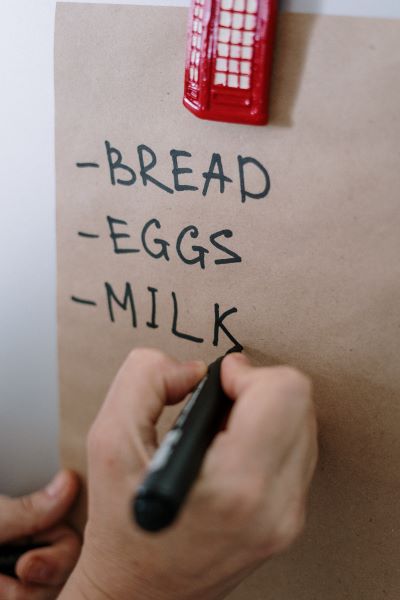Buy less. Choose well. Make it last.
Vivenne Westood, Fashion Designer
Make Considered Choices
Resist Impulse Shopping
Are you an impulse shopper? Even if impulse buying is not your usual pattern, you probably impulse shop on occasion. Maybe you need a fancy outfit on short notice for a special occasion, or you are shopping with friends and they convince you to buy something, or you find a good sale, or you are rewarding yourself after a success or consoling yourself after a stressful day, or any of a myriad of other reasons. If you have bought things on impulse, chances are good that some of those are items that you regret purchasing. It also is very likely that you have more things in your life than you need or want.
If you enjoy shopping, it can be especially difficult to break the habit of impulse buying. But one of the most important strategies for the minimalist approach is to replace retail therapy and its attendant impulse buying with more considered purchase practices. That is one of the greatest tools for success with minimalism and you’re sure to start to appreciate the benefits. You’ll spend less money and make better use of your limited space when you develop a new habit of being more thoughtful about buying decisions. Here are some tips to help you in that direction.
Consider Cost AND Value
One way to put purchases in perspective is to consider how long it would take you to earn the money for that item. When you have worked for your money, you want to get a good return and the best value. Another suggestion is to think about what else you could buy for a similar investment and decide which you would rather have. Buying something because it is on sale is only a good deal if they will wear well and serve you for a long time. Choose quality over quantity. If you are tempted to buy something on impulse, consider whether it suits both immediate and longer-term needs. Ask yourself how much use you will realistically get of it and whether it adds value to your life. Think about whether you will still be glad of the purchase in six months or a year. Make an informed decision based on these questions – or others that are relevant to your choice – before you make the decision to buy.
Replace Retail Therapy
If you have the habit of shopping as therapy or relaxation, that is a hard temptation to resist. It can help to spend some time to determine what it is that you most enjoy about shopping and find alternatives that can replace it. If it is the chance to walk and enjoy beautiful things, maybe a trail walk would be an alternative. If you like to shop with friends, try getting that through other social things like a class or a book club. If your prime motivation is to learn about new styles, maybe online fashion groups might satisfy that need.
For the times that you still feel the pull of shopping just for the experience of it, be aware of your feelings before you head to the stores. If you are driven by the need to relieve stress, sadness, anger or other emotions, be very conscious of any purchase impulses and give yourself time to check your why before you buy. Postpone your shopping trip if that is an option. Do something else that you enjoy instead. The same things apply to online shopping, which can be dangerous because it requires so little effort. Use the same thinking processes to combat impulse for online purchases. Take some time to be sure. Try walking away from the computer and into another room before clicking the submit button. Anything that forces you to think about your purchase before you make a decision helps to break the purchase cycle.
Shop Ethically
Taking a minute to think about the source of your items and the impact over the life of the product is another effective strategy to reduce impulse buys. As much as possible, support local businesses that make products with regional materials. Resist mass-produced fashion made to be replaceable. Consider the source and production and practices of companies that you support. Giving thought to where and how your objects are made helps you make more informed decisions. It helps ensure that you reduce your environmental impact and purchase sustainable options that will better serve you and your community. If you would like to learn more, check out my post on Choosing Sustainable Textiles for links to ECO-friendly options for clothing and textiles, as well as resources on how to evaluate the social responsibility of an organization.
Stick to a List
When you do go shopping, make a list and then stick to it as much as possible. You’ll be less likely to purchase only what you intend and be better prepared to avoid impulse buys. Of course, sometimes you forget about putting an item on your list and it make sense to pick it up when you see it, like when you are grocery shopping and are reminded of an extra ingredient you need to get for making dinner. In most cases, though, sticking to your list is the best practice. If you see an item you’d really like to have, take a picture or make a note, and give some thought before you buy to decide if it is worth buying. That way, if you do choose to buy, you can be more confident that you have made a good purchase and you will maintain the control of mindful choices.
Try a Shopping Ban
You can boost your efforts to reduce shopping with a temporary shopping ban. Set a time and define your rules. How long will it be – 1 week? 1 month? 6 months? 1 year? Choose a time that seems a little long so it is more of a challenge. What guidelines will you adopt? Will you limit yourself to only buying essentials or will you be more selective? Will you identify any exceptions? Define your ban then write it out and post where you will see it. For extra incentive, share with others for accountability – or perhaps even to get a ban buddy.
Here are A few examples:
- I will not buy anything but essentials for six months.
- I will not buy any physical objects online for four months (digital resources are allowed if I have a use for them within 2 months)
- We will not purchase any new clothing items for one year and if we buy any clothing item at a thrift shop or second hand store, it will be to replace an item that we already have and discard / donate/recycle the original
Try a ban for a limited time to help develop a new habit. You might even decide to keep going.
Take Action
This post offers several techniques that can stop impulse buying. You might have other strategies that work for you. The key is to delay the purchase until you have had a chance to intentionally decide whether or not any particular item is where you want to invest.
Challenge Questions for Day 14
Do you enjoy shopping? Why or why not? Do you frequently impulse shop? Or are you more prone to analysis before buying?
What are you most likely to buy on impulse? Why?
Is there shopping behaviour that you would like to change? Why? What action will you take to make the change happen?
Declutter Challenge for Day 14
Reader’s Choice
Today is Sunday, a good day to catch up with one of the earlier tasks or to take a break and reflect on your progress – and what you want to tackle next.
Banner photo Photo by Tim Mossholder from Pexels
Thoughtful online shopper photo by Liza Summer from Pexels
Shopping list photo by Helena Lopes from Pexels




Mary Elizabeth, I am totally with you on these principles. I generally don’t buy unless I need that thing. I shop with a list and don’t go down irrelevant aisles, unless I’m trying to get storage boxes or have another “solving” issue. We have taken to sending restaurant gift cards for birthdays and holidays, as most in my circle are trying to get rid of Stuff, not acquire more. Thanks for a great piece!
Thank you for commenting. We’re also moving to selected gift cards that we know people will use. We try to support local businesses when we buy those so people can explore in their own community and try some new places.
I don’t mind shopping but I am a saavy shopper. My method is if I see something I like but not necessarily need, I will pass it up and if it’s there the next time I shop I figure it must be for me. LOL That only works if it’s something for me, as for my great granddaughter and her mommy, I don’t think twice about getting them something.
I strongly dislike shopping so this one has not been one of my challenges. Well, except for books. And I am like you on not minding buying gifts but we have been really cutting down on the buying stuff in favour of making most of our gifts. Thanks for commenting.